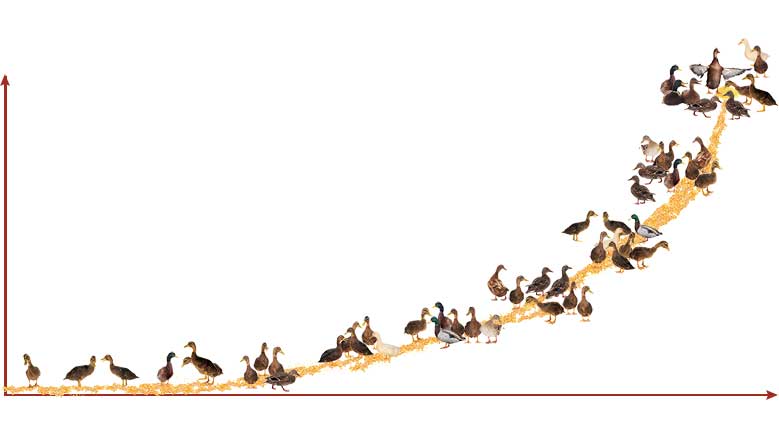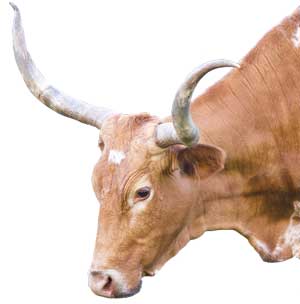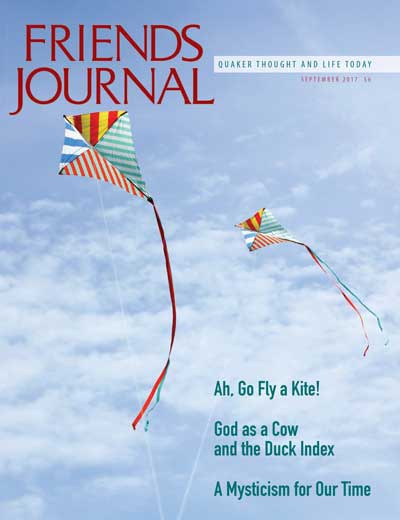
 I’m a city-dwelling woman, with nothing remotely agricultural going on. I have no chickens, no garden, not even a dog—but my spiritual life features livestock.
I’m a city-dwelling woman, with nothing remotely agricultural going on. I have no chickens, no garden, not even a dog—but my spiritual life features livestock.
On a recent Sunday I decided to go to worship with Friends. A decade ago I was a leader in this Quaker congregation, but I’ve rarely attended in the last few years. Walking toward the meetinghouse, I saw the back of my 94-year-old friend Ann and ran up the sidewalk to pat her on the back of her blue jacket. She turned and hugged me and said, “I thought you might be here. You have a way of showing up when you’re needed. With all these deaths lately . . .” She introduced me to her companions: “She was a great clerk. I remember her saying she was a cow, and we were her calves.”
“No, no, no,” I said, laughing. “God is a cow.” I explained to her friends: “I’ve lived with cows, and you have to show up to milk them every day at the same time, or they’re in pain. It’s all about faithfulness. You have to show up for God the same way—it’s a relationship. It’s not like a river where you come and dip your cup, and it makes no difference to the river. It’s about being there for the sacred in yourself, and for . . .” I waved my arms around, indicating some kind of flow between me and an invisible something.
Ann gripped her cane and followed us into the meetinghouse. “Oh, that’s a much better twist. I like that better.”
I took a seat in the quiet meetingroom. Half an hour or so into the silence, another old friend of mine stood up. “It’s one of those days when I can feel the Spirit alive in this room, and it has moved me to stand and speak, though I don’t know yet what I’m going to say.” She spoke about the rain on the skylight and then, looking across the room, added, “My friends tell me to take myself less seriously. I see Tina here, and I remember when she told us that God was a cow.”
I shook my head, startled, wondering why this cow story was so present.
Like much of the stuff I know, I got this image from a dream. God, a big long-horned cow, is mad at me for not showing up reliably to milk her, and she is tossing me on her horns. After one high toss, a hand reaches out and catches me.
In my youth I was responsible for the morning milking of a Jersey cow. I loved that job: leaning my head against the huge, hairy, warm wall of cow; being skillful and rhythmic with my hands; hearing the pinging stream of milk hit the bucket; and carrying the warm bucket back to the kitchen.
I knew what a burden the cow carried. I knew it would be painful, and then make her sick if we didn’t milk her twice a day, every day, same time. I would never have decided one morning to sleep in, or to skip a milking because I had something “better” to do. I was responsible to this living being, so I made it to the barn every morning.
When I had the dream—years after I knew that cow—I’d just moved back to Oregon after working at a Quaker retreat center in Pennsylvania. We started every workday there with a half-hour of silence. I cherished that quiet time together: students, staff, teachers, sitting down in the old stone-walled meetingroom, placing ourselves in the stream of the sacred to start our day.
In Oregon, I jumped back into a noisy world. Sitting down for half an hour of silence by myself every morning wasn’t even a shadowy desire; it never occurred to me. The list—clean the sinks, plant the peas, please my boss—ran my life.
Then I had the dream. It was quite a corrective to my fantasy that my failures affected no one but me. What if my inability to sit quietly every morning was causing some living being actual pain, like a cow that doesn’t get milked? Ow!
Up to that moment, I’d operated along on the river model of God, the one I told to Ann’s friends in front of the meetinghouse. If I’m thirsty I can go down to the river, but the river doesn’t know—or care—whether I come or not. The river is enormous, endless, so big that I am irrelevant to its flowing. Not that I actually thought of God as a river, but it was a good picture of my lack of obligation and my lack of importance.
That is such a different model from the cow. The river lays no burden on me, and the metaphor doesn’t begin to get at the sense of belonging and connection, of being knitted in, that I now believe is key to living a happy life.
I understood the dream’s message, but I didn’t do anything about it.
In 1984, a few years before the cow dream, I had an important dream about horses. I don’t have much waking experience of horses: I can ride but not well. Nonetheless, this jeweled fairy tale of a dream, which I call “Ask for Horses,” has stayed bright in my heart for over 30 years:
I live in a mountain village in Central Asia. Some peddlers suddenly and mysteriously arrive, and lay out trade goods on a carpet. Someone taps my shoulder. I know it is the shy, ragged person called the bird-girl, who came with the peddlers.
“Don’t turn around. Do you think they will give you a gift?”
I ponder this strange question. Why would the peddlers give me a gift? Finally, I conclude that to keep the story going I have to say yes.
The voice behind me, relieved, says, “Good. Then you must ask for horses. They will expect you to choose one of the trinkets on the carpet, but they have a herd of Siberian horses off on the steppe. They will have to give them to you if you ask. They won’t like it, but they’ll do it.”
I walk all night, working up the nerve to ask. I never ask, but I believe there is still time.
This dream went very deep into my bloodstream. Ever since I heard those whispered instructions from the bird-girl, I’ve wondered about them.
Where do I say yes to the possibility of some mysterious gift?
How do I ask not for trinkets, or what’s laid out for me, but for something so amazing and alive and challenging that it will blow my life open? Something I can’t see from here, something far away.
You could say that this story played out in 1995 when I asked my second husband to marry me (after living together for four years) so we could adopt a girl from China. The two brilliant little girls that became our daughters—now in college—are surely horses in the spirit of the dream. It was hard to ask for them; I was afraid to ask. We had to travel a long way to get them, and they did indeed blow my life and heart wide open.
Though it did play out in that miraculous way on other levels of my life, I’m still in the middle of the Ask for Horses adventure. Those questions are as alive in me as they ever were.
The cow taught me faithfulness. The horses keep teaching me courage. Ducks, on the other hand, are on a mission for joy.
They didn’t come from a dream. They came from a book about the Nonviolent Communication program. Marshall Rosenberg, who developed NVC, suggested we have these unspoken words behind any request we make:
“Please do as I requested only if you can do so with the joy of a little child feeding a hungry duck.” (Not out of fear of punishment, or a need to please. Not from guilt, shame, duty or obligation, or desire for reward.)
Judith and Ike Lasater, who wrote a book called What We Say Matters about how Nonviolent Communication works in their family, expanded this idea into a duck index. It’s a scale of one to ten. Ten is the full-on joy of feeding hungry ducks, and one is no ducks at all. When wondering whether to do something, like go to a party or take on a job, Ike and Judith check in with themselves to see how high it is on the duck index. The prospect has to have at least five ducks for them to go ahead.
I love this concept. I am a pest with it. Whenever I hear someone trying to make a decision, I leap in with the duck index. I even have my own version, which is, “I know what a yes feels like, and everything else is a no.”
I do know what a yes feels like. It happens in my chest, like warmth; or in my belly, like a gong going off; or on my skin, like goosebumps. I know what a no feels like, too: a sinking feeling in my stomach; a flooded, confused feeling in my head. But I haven’t been good on the maybes. I can easily confuse a desire to please with a yes if I’m not paying attention. Just a couple of years ago, someone I admired, a hard-working volunteer, asked me to take over the chairmanship of a committee. I said yes because I wanted his approval, wanted to belong, and wanted to be a giver instead of a taker. I didn’t check to see if there were ducks in it. If I’d checked, there would have been three ducks: not enough. And it turned out to be full of stressful inter-committee politics. I could have saved myself a pile of grief had I paid better attention to my body’s clues before I took the job.
If I really lived my days following ducks, I’d have a lot of fun, like being in a parade. But the problem is that it’s been hard for me to accept that if it’s not a clear yes, everything else is a no. In a way, my maxim is stricter than the Lasaters’ duck index—at least they have room for gradations. Mine is stricter because I’m sorely inclined to do things in the “maybe” territory.
I offer these lovely teachings to anyone who will listen:
- Cow: Be faithful to a daily practice of silence and presence and listening. Accept that what you do, or don’t do, matters to the whole.
- Horses: Ask big. Ask bravely. Don’t settle.
- Ducks: Do only what makes your heart sing.
Those teachings came to me and stuck to me, not because I was so wise, but because I was a mess. I was almost frantic since I was about 13. I lived in more than 40 places by the time I was 40, and several more since then. All that moving made it hard to live a life that had any discipline to it. I do now have a daily habit of meditation, but it took me about 24 years after having the cow dream to calm down enough to make it happen.
I’m also naturally inclined to settle for what’s on the table (the peddler’s carpet), not to ask big. My two marriages come to mind: I expertly squeezed myself—well past the point of hurting—into relationships where I did not quite fit. I got smaller and lonelier, and, in the case of my second husband, scared. And truly, most of my life has been lived by anything but ducks. I’ve acted a million times from fear or a sense of obligation. And I will again.
The two dreams had to be dramatic to get my attention. Ducks had to come parading into my mind like a set of bells. I’m so grateful to my animal guides—not wild creatures like a bear or wolf or eagle, but beautiful everyday animals—for recognizing my need, and sticking with me all these years.
Maybe the reason that the story of God as a cow was so present at meeting on that Sunday was because it was time to write about it. Or maybe it was because I need that story right now. Four people in the meeting had died in the span of a month. One died by jumping off a building. She too was a mother of an adopted Chinese girl; I helped support her through the Chinese adoption maze. Our daughters knew each other when they were little. And the previous Saturday, my boyfriend and I broke up after eight rich years. There’s blood and heartbreak in the water right now, and I have need of the milk of that cow. It helps to be reminded not only of my obligation to show up, but of the generosity of whatever is on the other side of this arrangement—the big invisible flank I’m leaning my head on, the warm, frothy, life-giving food.




What wonderful life-giving images as guides to living. I love them all.
Thank you for sharing your dream images Tina.
Beautiful, life-giving, kind, funny, sweet, true, true, true… Bless you, dear Tina!